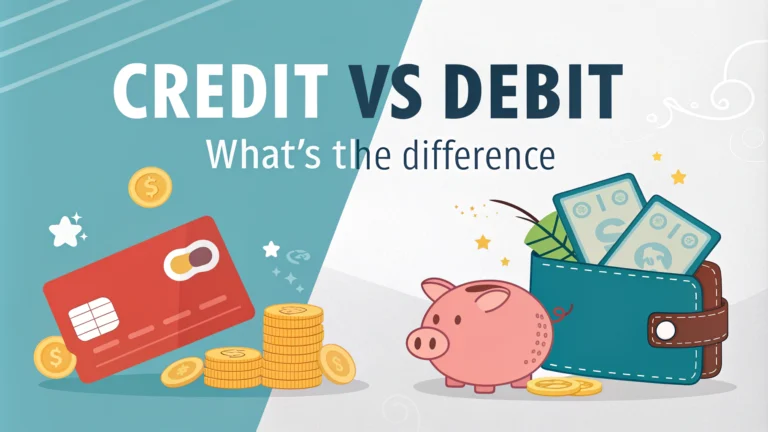Making smart choices about payment methods can significantly impact your financial health. Credit and debit cards may look similar, but they work in fundamentally different ways – understanding these differences helps you make better spending decisions.
**Security features**, **purchase protection**, and **payment timing** set these cards apart. Whether you’re building credit history or managing daily expenses, knowing when to use each type of card puts you in control of your money.
Key Differences Between Credit and Debit Cards
- Credit cards use borrowed money with delayed payment
- Debit cards withdraw directly from your bank account
- Different fraud protection levels and dispute processes
- Varying impact on credit scores and financial records
Benefits of Using Credit Cards
- **Rewards programs** (cashback, miles, points)
- Better fraud protection (limited liability)
- Credit score building opportunity
- Purchase protection and extended warranties
- Emergency funding access
Advantages of Debit Cards
- Direct connection to your bank account
- No interest charges or annual fees
- Helps prevent overspending
- Immediate payment tracking
- **Zero debt risk** when used responsibly
| Feature | Credit Card | Debit Card |
|---|---|---|
| Payment Source | Borrowed Money | Your Bank Account |
| Interest Charges | Yes (if not paid in full) | No |
| Rewards | Common | Rare |
Choosing When to Use Each Card Type
Different spending scenarios call for specific payment methods. **Large purchases** and **online shopping** often benefit from credit card protection, while everyday expenses work well with debit cards.
- Use credit cards for:
- Major electronics and appliances
- Travel bookings
- Online shopping
- Use debit cards for:
- Groceries and daily expenses
- ATM withdrawals
- Small local purchases
Smart Credit Card Management
Good credit habits prevent debt accumulation while maximizing card benefits. Set up **automatic payments** and track spending through mobile apps.
- Pay full balance monthly to avoid interest
- Keep credit utilization below 30%
- Monitor statements for unauthorized charges
- Set up balance alerts
Debit Card Safety Practices
Protect your bank account by following essential security measures. Use **chip readers** instead of magnetic stripes when possible.
| Security Measure | Why It Matters |
|---|---|
| PIN Protection | Prevents unauthorized access |
| Regular Balance Checks | Quick fraud detection |
| Bank Alerts | Immediate transaction notification |
Building a Balanced Payment Strategy
Design a personal payment system that combines both card types strategically. Match payment methods to your spending habits and financial goals.
“The best payment method is the one that helps you maintain control over your spending while providing maximum security and benefits.”
- Review monthly statements to optimize card usage
- Adjust payment methods based on spending patterns
- Keep emergency funds separate from daily spending accounts
- Consider linking cards to digital wallets for added convenience
FAQs About Credit and Debit Cards
General Questions
Q: What’s the main difference between credit and debit cards?
A: Debit cards use your existing bank account funds, while credit cards borrow money that you must repay later, typically with interest if not paid in full.
Q: Which is safer – credit or debit cards?
A: Credit cards generally offer better fraud protection and zero liability policies. With debit cards, stolen money comes directly from your account and can take longer to recover.
Q: Do credit cards build credit score but debit cards don’t?
A: Yes. Credit card payment history is reported to credit bureaus and affects credit scores. Debit card usage does not impact credit scores.
Specific Use Cases
Q: Which card should I use for online shopping?
A: Credit cards are recommended for online purchases due to:
- Better fraud protection
- Ability to dispute charges
- No direct access to your bank account
Q: Can I use my debit card for car rentals?
A: While possible, it’s not recommended. Car rental companies often place large holds on debit cards, freezing significant amounts in your bank account.
Financial Impact
Q: Do merchants pay higher fees for credit vs debit transactions?
A: Yes. Credit card processing fees typically range from 1.5-3.5%, while debit card fees average 0.3-2.5%.
Q: How do credit card rewards compare to debit rewards?
A: Credit cards usually offer superior rewards:
| Credit Cards | Debit Cards |
|---|---|
| 1-5% cashback common | 0-1% cashback typical |
| Travel miles/points | Limited reward options |
| Sign-up bonuses | Rarely offer bonuses |
Long-tail Keyword Questions
Q: Which is better for international travel – credit or debit cards?
A: Credit cards typically offer better exchange rates, zero foreign transaction fees (on travel cards), and better fraud protection during international travel.
Q: Does using a credit card for gas cost more than debit?
A: Some gas stations charge higher prices for credit card purchases (usually 10-15 cents more per gallon) due to processing fees.
Q: Can I withdraw cash from ATMs with both credit and debit cards?
A: Yes, but credit card cash advances incur immediate interest charges and additional fees. Debit cards typically only charge ATM fees if out of network.
Q: Which card type offers better purchase protection for electronics?
A: Credit cards typically provide better purchase protection, including extended warranty coverage and theft/damage protection on recent purchases.



















